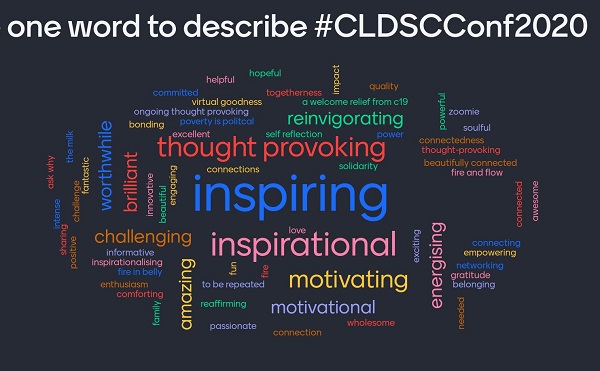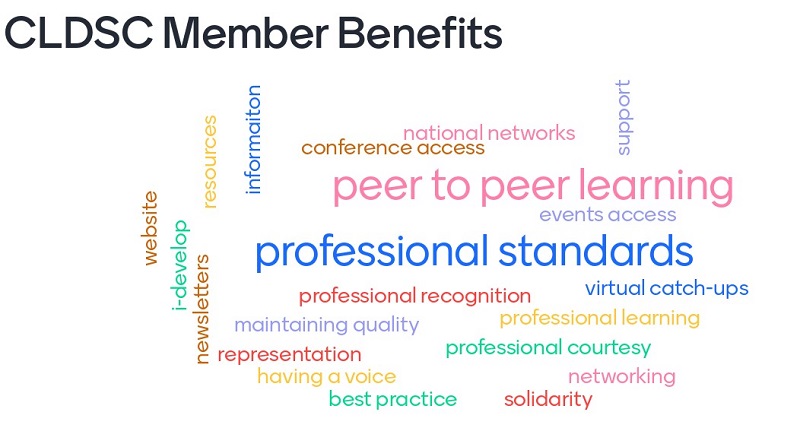CLDSC Member Bulletin – 10 February 2021
COVID-19 Further and Higher Education Ministerial Task Force: CLD Students
Our Director, Dr Marion Allison will be representing the CLD Standards Council on the recently established Ministerial Task Force. This group was established by Mr Richard Lochhead, the Minister for Further Education, Higher Education and Science to address the immediate challenges in this academic year and then consider longer term consequences for students completing their qualifications on business and the economy, for example, completing their qualifications, practice placements and the future pipeline of suitably qualified CLD practitioners.
Members’ Virtual Meet-up, 26 February
The next Virtual meet-up is on February 26th, 1 – 2 p.m. We’ll be talking about climate change, the Scottish Government’s draft strategy for public engagement on this, and what the role of CLD is, can and should be. Under the strategic objective of “Enabling Participation in Policy Design” the strategy’s aim is that “People actively participate in shaping fair and inclusive policies that encourage adaptation to and mitigation of climate change”. Is this part of what you currently do? Do you think you should be more involved? Do you need support for this?
Register to attend the meet-up on Eventbrite and come along to share experiences and ideas about CLD practice and climate change.
Youth Work Research Reports
Further to the Impact of Universal Youth Work national study report published in 2018, a series of studies have been conducted aiming to add to the evidence base. You can find out more on the YouthLink website. The latest study focused on the impact of LGBT Youth Scotland’s digital youth work on young people during lockdown. Read the LGBT Youth Scotland report (PDF).
Collaborative Research Inquiry Opportunity
A partnership between the Professional Association of Lecturers in Youth & Community Work (TAGPALYCW) the Open University, University of Glasgow and the University of Hull is launching an inquiry running from now until June 2022.
The aims of the project are twofold:
- Firstly, it will examine and capture the experiences of lecturers teaching on youth and community work programmes during the current pandemic, the issues and challenges that COVID is presenting, and how they are creatively addressing these challenges.
- Secondly, the research will look forward to the future post-pandemic (whenever that might be). In a context of great uncertainty, it will explore what the future might look like for youth and community work and youth and community work programmes? Ask whether the pandemic will lead to longer term change in learning and teaching methodologies – including opportunities for learning through collaboration? And, investigate how students can be prepared for working with young people and communities; and for navigating practice in the society that emerges post-COVID?
If you are interested in participating, there is more information on the TAGPALYCW website and you can email: hello@tagpalycw.org to express your interest by Friday 19th February. All participants will then be contacted with a full participant briefing pack, submission instructions and invitations to the enquiry sessions.
The inaugural SCQF Week and March workshops announced
SCQF Week from 15-19 March needs your support! Join in by sharing your own achievements and the SCQF Level of your learning.
SCQF are delighted to announce the very first SCQF Week taking place from 15 – 19 March 2021. The event intends to highlight the important part the SCQF plays in the learner journey. It will celebrate the achievements of individuals and showcase best practice in the use of the SCQF across a range of sectors, as well as raise awareness of the SCQFP’s latest projects and developments amongst partners and stakeholders. Find full details on the SCQF website
To help SCQF find and share any posts please tag @SCQFPartnership and use #RecognisingSkills and #RecogniseMySkills
SCQF also have additional online workshop opportunities in March focusing on Recognition of Prior Learning (RPL). For further details and how to Register for these please see this SCQF information page.
Shifting the Balance of Power
Research on “community power” during the pandemic, carried out by New Local for the Carnegie UK Trust, explores how councils and communities have worked together to do “extraordinary things during Covid-19”, how practices, cultures and attitudes changed – and how to keep hold of some of the advances for the future. The Shifting the Balance report presents real-life examples of where this approach has flourished, puts forward recommendations for councils, communities, and civil society groups to sustain partnership working and local decision-making, and encourages UK and devolved governments to make room for this to flourish.
News From Carnegie UK Trust February 2021 includes a wealth of other information relevant for CLD practitioners.


